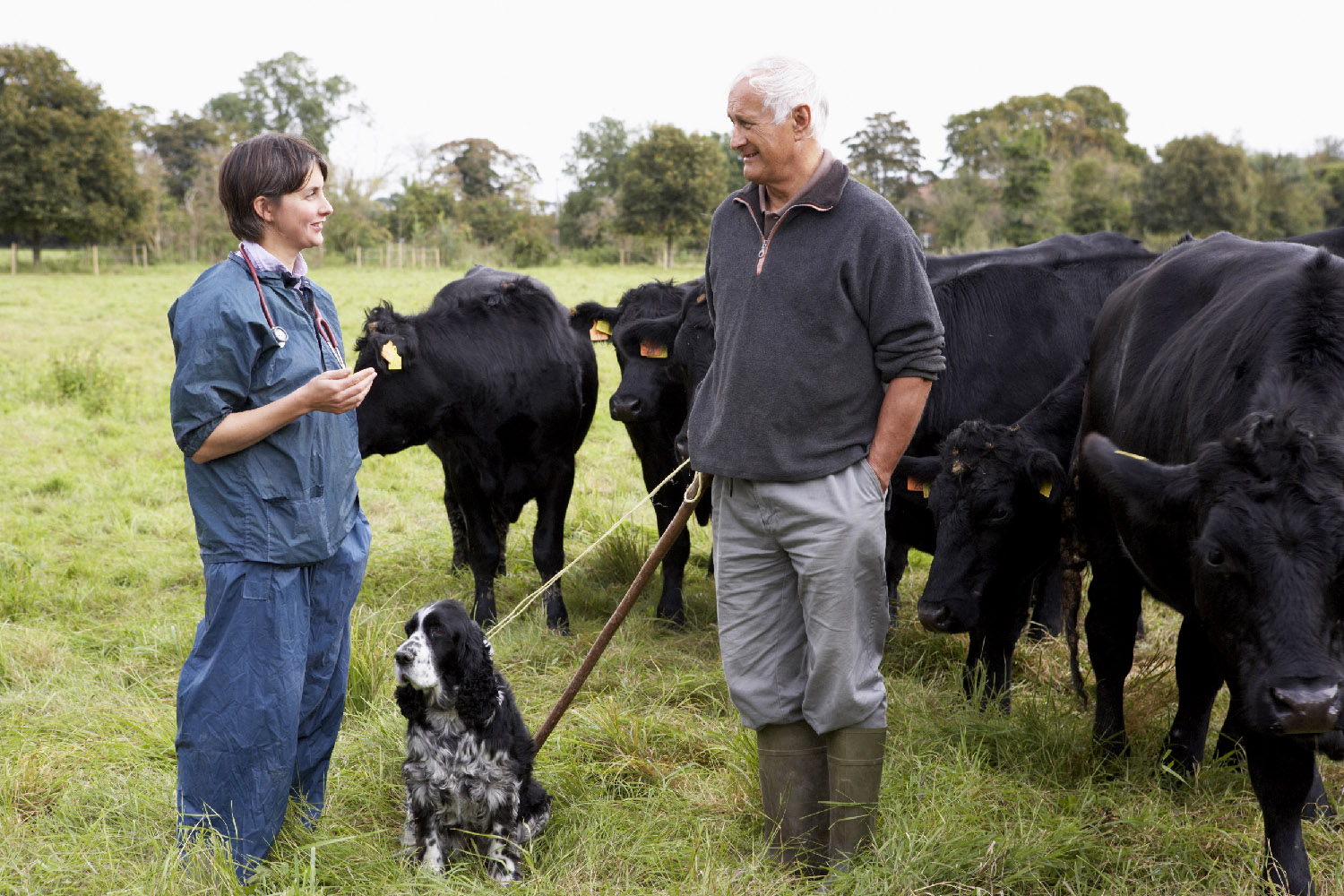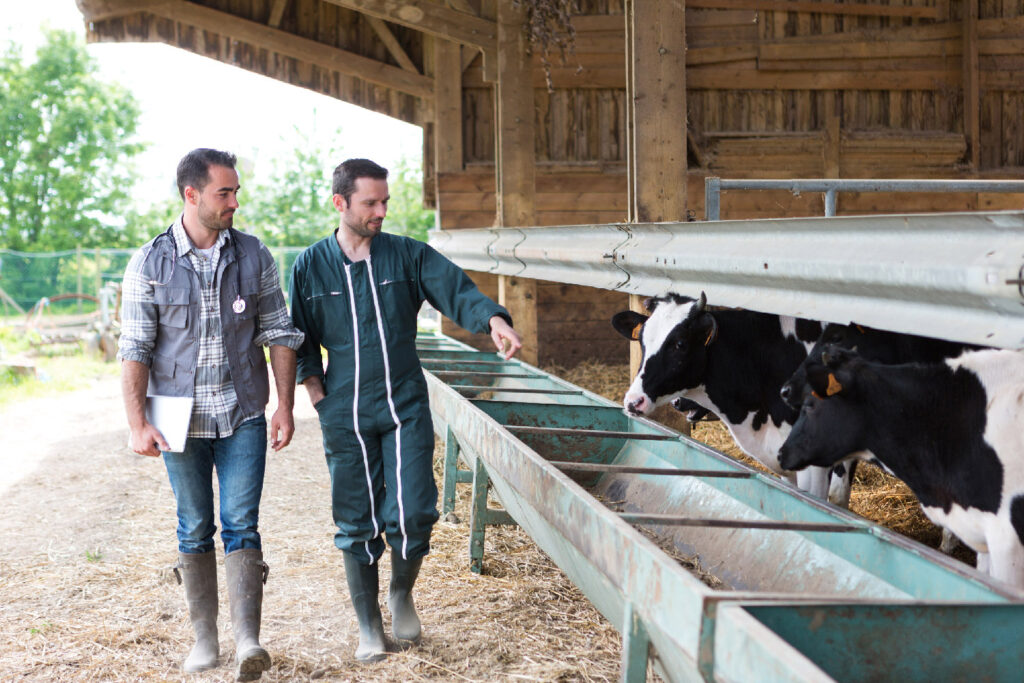6 The role of veterinarians and other animal health professionals on organic/alternative operations
Hardworking, knowledgeable, and passionate about their work and way of life. This description of animal health professionals and organic and alternative (O/A) livestock producers indicates they are more alike than different. No one has all the answers. Producers are not disease diagnosticians, and animal health professionals are usually not knowledgeable about non-conventional treatments nor financially responsible for farm operations. Therefore, trust, respect, and open minds are needed for a partnership between producers and animal health professionals to grow and help each other achieve their common goals – improving and maintaining animal health.
The active role of veterinarians on livestock operations is well laid out by the in the Guide for Organic Livestock Producers (Coffee & Baier, 2012). Despite its age, (2012) the USDA Guide for Organic Producers provides timeless written guidance for organic livestock producers, including information on the use of veterinarians on their operations. Very little has been written about the role of other animal health professionals such as veterinary technicians and extension specialists on O/A operations. Both of these roles have obvious and important contributions to make to organic and alternative animal health.
The Role of Veterinary technicians and extension professionals
Veterinary Technicians have many roles, both inside and outside of the clinic. Vet techs often travel with veterinarians to farms and ranches in mixed and large animal rural practices. They provide useful skills and support to veterinarians and clients. Skillful vet techs offer a second set of eyes for the veterinarian. The vet tech’s role includes giving drugs and vaccines, collecting samples, assisting in field surgery, and explaining procedures, including disease prevention actions such as cleaning and disinfection. The skill set that vet techs bring to O/A farms and ranches is no different. On O/A farms, vet techs can bring new skills and knowledge to assist veterinarians and help producers manage and care for their organic and livestock.
Agricultural extension programs provide non-formal education and practical application of science on farms. Extension agents and specialists help producers assess their needs and have resources and programs that farms can use or adapt to fit their needs. Extension provides resources to increase production in addition to safety classes, youth development, nutrition education, and mental health resources. These resources are important and provide for farmers’ welfare and personal development and help build future generations of farmers. O/A knowledgeable extension agents can help connect valuable practices and applicable research with farmers and ranchers needing assistance and increase the benefit to those they serve. O/A farming is a prospect for growth for extension programs (Alotaibi et al., 2021).
When it comes to the role of veterinarians, the history of veterinary use and the willingness of O/A producers and veterinarians to work together has been implicated. Let’s explore this more.
The veterinary perspective
Generally, veterinarians have mixed feelings about their ability to meet organic producer needs and believe they lack knowledge of organic guidelines and health treatments (O’Neill & Wells, 2013; Sorge, 2019; Yamashita et al., 2019). These feelings likely mirror those of other animal health professionals and essential veterinary support staff. In a 2013 survey of Iowa veterinarians and organic livestock producers, less than 1% of veterinarians said they received instruction in organic livestock during veterinary school and agreed they need more information (O’Neill & Wells, 2013). These deficiencies appear to be universal across veterinary education systems, including veterinary technician and other animal health professional training programs. It is difficult to find the time and space to include more courses in the already jam-packed veterinary, or similar curriculums. Currently, if they are interested, students would likely have to find that information through internships and externships during their senior year, reading up on the subject, and continuing education (CE) courses such as this. When asked about the availability of O/A farming information, veterinarians said current (2013) information was scarce, that they relied on the internet for sources of information on organic livestock, and suggested seminars and conferences as training options. Most veterinarians surveyed (72%) said they would attend an educational event () related to organic livestock (O’Neill 2013). These deficiencies and suggestions highlight the need and desire for more educational resources on O/A farming and the veterinarian’s role (O’Neill & Wells, 2013). This extends into veterinary technician and animal health professional training as well.
When looking at specific species, a survey of bovine practitioners in 2019 found more than half of them thought organic rules were difficult to follow and that they lacked knowledge about organic regulations. As a result, these difficulties inhibit them from including organic and alternative farmers in their practices. Technicians and other professionals with knowledge about organic agriculture could be vital resources for veterinarians trying to work with organic and alternative producers. It is important to note that when these results were stratified by practitioners who had organic clients and those that didn’t, veterinarians with organic clients were more likely to have positive responses regarding the ease of use of organic regulations and were less likely to agree that organic producers would not use veterinary advice. In this study, experience working with O/A clients provided a more favorable perspective. As a result, helping veterinarians gain more experience with these clients can be beneficial for all. Combined with observations from the 2013 O’Neill study regarding gaps in perception, knowledge, and communication among individuals in organic livestock systems (veterinarians and producers), these results indicate that positive working relationships between these groups are possible. How can mutual understanding and positive relationships best be developed between organic livestock producers and veterinarians?
(The studies cited above relate to organic dairies vs. conventional dairy operations. It should be noted that similar research regarding O/A beef, sheep, goat, poultry, swine, or egg operations hasn’t been reported and is less clear).
The producer’s perspective
 Despite USDA recommendations, studies have shown that O/A livestock producers often do not use veterinary services as frequently as their conventional counterparts and instead seek animal health advice from other sources or handle problems independently (O’Neill & Wells, 2013). These producers are more likely to rely on past experience, other producers, word of mouth, books, organic workshops, field days, and the Internet when dealing with common problems. (O’Neill & Wells, 2013; Richert et al., 2013). O/A livestock producers do not see the need to consult a veterinarian or their staff for several reasons. Commonly reported reasons are they feel that their livestock are healthier than conventional livestock, they perceive a negative mindset of some veterinarians and other animal health professionals toward organic agriculture, or they believe veterinarians do not have the appropriate knowledge of organic regulations and allowable substances (Sorge et al., 2019).
Despite USDA recommendations, studies have shown that O/A livestock producers often do not use veterinary services as frequently as their conventional counterparts and instead seek animal health advice from other sources or handle problems independently (O’Neill & Wells, 2013). These producers are more likely to rely on past experience, other producers, word of mouth, books, organic workshops, field days, and the Internet when dealing with common problems. (O’Neill & Wells, 2013; Richert et al., 2013). O/A livestock producers do not see the need to consult a veterinarian or their staff for several reasons. Commonly reported reasons are they feel that their livestock are healthier than conventional livestock, they perceive a negative mindset of some veterinarians and other animal health professionals toward organic agriculture, or they believe veterinarians do not have the appropriate knowledge of organic regulations and allowable substances (Sorge et al., 2019).
However, the decreased use of veterinarians on O/A farms is not clear-cut. One study of 292 organic and conventional dairy farms in New York, Oregon, and Wisconsin found that veterinary usage was more closely associated with intensiveness of management practices (i.e., pregnancy checking, use of a nutritionist, use of AI for breeding) than whether a farm was classified as organic or conventional. O/A operations are usually smaller, less intensive operations, so their lack of use of veterinary services is not surprising in this regard. The perception is that organic livestock producers are averse to using veterinary services. But in fact, it may be at least in part, that producers just don’t need them in the traditional-conventional dairy practitioner sense. This supports the study’s recommendation that veterinarians should not assume that organic herd managers are unwilling to use their services (Richert et al., 2013). Again, this study related to organic dairy operations and the applicability to other types of operations has not been reported.
The varying viewpoints indicate a need for greater communication and understanding between veterinarians, technicians, extension, and O/A producers. This includes discussions of where they can be used (disease diagnosis is an obvious example) and where new opportunities might present themselves. Potential collaborative opportunities may entail nutritional consulting, consulting on organic certification and humane certification, food safety, biosecurity, disease prevention tools and tactics, record keeping, and more. These discussions will evolve, requiring open minds, a partnership mentality, scientific knowledge, and good communication.
Increasing the role of all types of animal health professionals on O/A farms will require training, open minds, and new ways of thinking. The health of our food, farms, and livestock depends on it.
Organic and/or Alternative
United States Department of Agriculture
when a non-mainstream approach is used in place of conventional medicine
continuing education
Amish and conservative Mennonites
Veterinarian-Client-Patient Relationship


